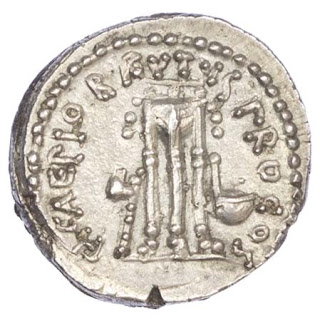Along with his fellow assassin Cassius, Brutus had fled to Asia in the aftermath of Julius Caesar’s assassination, and he was busy collecting troops and money so that he could fight Mark Antony and Octavian (later Rome’s first Emperor, Augustus) for control of the Roman Republic. This coin would have been used to pay his troops, and he entrusted the task of minting it to a junior official, Lucius Sestius.
With this imagery, Brutus is justifying his assassination of Caesar - he has made a sacrifice to Liberty, with Caesar as sacrificial victim. If we dig a little deeper, we discover that Brutus also sacrificed his personal friendship with Caesar.
An interesting connection not often mentioned is that Brutus’ mother, Servilia, was Caesar’s favourite mistress, and Brutus himself had been greatly favoured by Caesar, giving rise to the rumour that he was Caesar’s son. But he was persuaded, probably by Cassius, that Caesar threatened Rome’s liberty. (Another connection - Cassius was married to Brutus’ half-sister, Junia Tertia.) Brutus’ final sacrifice came at the Battle of Philippi: when he realised that he had lost, he committed suicide.
Now for the other man who put his name on this coin. Lucius Sestius Quirinalis is not a famous Roman, but he pops up in our sources several times. Dig around again, and you will find out that Lucius survived the Battle of Philippi, and twenty years later was honoured by the man against whom he fought – the emperor Augustus. The historian Cassius Dio tells us:
“Augustus appointed as consul Lucius Sestius– a man who had worked and fought for Brutus and even now honoured Brutus’ memory. Not only did Augustus not begrudge Sestius’ loyalty and affection for Brutus, he even honoured it.”
My coin tells us just a little about the ramifications of one fateful day in Roman history, but if you want to explore more about the end of Rome’s Republic and the men who fought a bitter Civil War over it, I heartily recommend Robert Harris’ excellent Imperium trilogy. There is also my own trilogy about Lucius Sestius (Rome’s End, The Emperor’s Servant and Blood and ^) and The Third Daughter, the story of Brutus’ sister, Junia Tertia. All found on Amazon!
Fiona Forsyth
# # #
About the Author
From the age of six when she was introduced to the myths of Greece and Rome, Fiona Forsyth wanted to explore the differences between our world and theirs. Curiosity led her to study Classics at a time when most people told her that Latin was not useful: she then earned a living teaching it for twenty-five years before a family move to the Middle East gave her the opportunity to write about it. Now back in the UK, she has published four novels with Sharpe Books, and is working on number five. Find out more at Fiona's website https://fionaforsythauthor.co.uk and find her on Twitter @for_fi
.jpeg)



No comments:
Post a Comment
Thank you for commenting